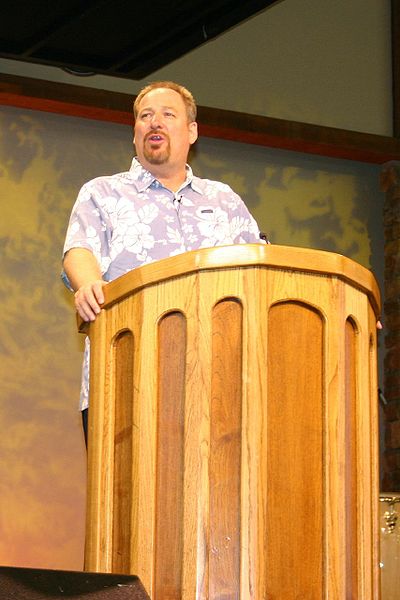いくつかの提案
[toggle]Some suggestions[/toggle]これからどの方向に進むべきかを考えるのは別に難しいことではない。私も説教する経験がある立場から、この記事で提案することを許してほしい。
[toggle]The way forward is not hard to fathom, and let me take privilege of being more hortatory in this article, as I do have experience in preaching. [/toggle]まず、説教壇を取り戻すことを考えていいかもしれない。それは以前の教会を思い出させるようなものである必要はない。説教者が教会の委託を受けていること、その説教が究極的には教会の権威の下にあること、そしてすべては神の支配下にあるという事実を視覚化するような現代的な説教壇を設計してはどうだろうか。その説教壇のデザインは、「神が語る言葉である説教は、その言葉を語る者ではなく、説教者の傍らに立ち、また上に立つ神について語られるものだ」ということを明確にするものでなければならない。
[toggle]First, we might bring back pulpits. It doesn’t have to be the kind that remind us of churches of yesteryear. How about designing a contemporary pulpit that accents the fact that the preacher has been commissioned by the church, and that the sermon is finally under the authority of the church—all of which is under the authority of God? Something that says in its design that in this moment, the sermon—the spoken word of God—is not about the speaker of that word but about the God who stands with and above the preacher. [/toggle]第二に、牧師は説教を短くして、一人の人間の声が礼拝に占める割合を減らすべきだろう。もっと賛美する時間を増やしてもいい。祈る時間を増やしてもいい。沈黙の時間を作ってもいい。定期的な聖餐や儀式の時間を増やしてもいい。つまり、神のための時間を増やすべきということだ。
[toggle]Second, pastors might shorten the sermon so that the service is not dominated by one person and one voice. We can make room for more singing. Make room for more prayer. Make room for silence. Maybe make room for the regular celebration of the sacraments/ordinances. In other words, we can make room for God. [/toggle]それは、牧師が説教準備にかける時間を増やすことを、信徒が受け入れなければならないことを意味する。信じられないかもしれないが、長い説教より短い説教を準備するほうが準備に時間がかかる。すべての単語やフレーズがますます重要になるし、何を残し、何を省くべきかについて、説教者は一生懸命考える必要があるのだ。
[toggle]That means congregations have to give the pastor more time for sermon preparation. As hard as it might be to believe, it takes more time to prepare a shorter sermon than a longer one, because every word and phrase becomes ever more weighted. It requires the preacher to think hard about what to keep in and what to leave out. [/toggle]
サドルバック教会牧師のリック・ウォレン
第三に、個人的なエピソード・トークからいったん距離を置くことをお勧めする。その数を減らすために、一つ一つのエピソードを長くしてもいい。「エピソード・トークをやめよう」と決めた瞬間、説教者たちは、自分がいかにそれに依存していたかを理解するようになる。何週間かそのやり方を使わないように試みていれば、話の中心点を伝えるために、つい自分の話や経験談を語ろうとする感覚を何度も経験することだろう。
[toggle]Third, I’d suggest we put a moratorium on personal illustrations—or at least go to some lengths to curtail the number. Preachers can tell they have become addicted to personal illustrations the moment they decide to stop using them. Try for a few weeks not to use any, and what you’ll see is your mind returning to yourself and your experience time and again to drive home a point. [/toggle]確かに、私たちが生きている週刊誌やフェイスブックの時代では、人々は他人の生活の詳細を知ろうと血眼になっている。自分の生活の一部を紹介しないと、その人の信ぴょう性が認められないこの文化では、ときおり個人的なエピソードを入れ込まないと、人々と対話することが難しいかもしれない。人々は、講演者や説教者、作家たちと個人的なつながりを感じたいのだ。私たちがこの文化の中で会衆を獲得したいのであれば、人々に自らの生活の一部を提供する必要がある。私がゲスト・スピーカーとして教会に招かれるとき、講演の始めのあたりに個人的な小話を一つするのはそのためだ。良くも悪くも、それによって観客が私に耳を傾ける可能性は高くなる。本を執筆する時にも、出版社は同じ理由でそういう話を入れるようにと言ってくる。
[toggle]Of course, in a People magazine/Facebook culture, where we are dying to know the intimate details of others’ lives, where someone doesn’t seem authentic unless they reveal something from their personal life—well, we cannot be effective communicators in this culture without dropping in the occasional personal illustration. People want to identify personally with speakers and preachers and writers. So if we want to gain an audience in this culture, we have to offer them a bit of ourselves. This is precisely why, when I am a guest speaker at a church, I try to include one personal illustration toward the beginning of my talk. For better or worse, it makes it more likely that the audience will give me an ear. It’s also why my publisher asked me to include a few in my book. [/toggle]それは私も分かっている。しかし牧師には、私生活を会衆に話す機会など、礼拝の時以外にいくらでもあるではないか。毎週毎週、説教を伝えるために自分の人生を語らなければならない理由を理解できない。個人的なエピソード・トークを支えに、牧師の周りにはゆっくりと着実に、個人にのめり込ませるカルト集団が生まれ始める。そんな実例を私はあまりにも多く見てきた。
[toggle]So I get it. But I’m unclear why a pastor, who has all sorts of occasions other than worship to lift the veil and let the congregation see him as more than a preacher, needs week after week to draw on his own life to drive home a point in sermon after sermon. And I’ve seen too many instances when the personal anecdote becomes such a crutch that a cult of personality slowly but surely begins to develop around the pastor. [/toggle]その理由の一部は、怠惰ゆえだ。信じてほしい。私にはそれに取りつかれた知り合いがいる。たくさんの本を読むより、自分の記憶から話をするほうがはるかに手軽だ。そして、日曜日の朝が近づいてくると、私たちはどうしても個人的なエピソード・トークに手を出してしまう。
[toggle]Part of this is due to sheer laziness—believe me, I speak from personal acquaintance with the vice. It’s so much easier to reach into one’s memory than it is to read extensively. And when Sunday morning is breathing down your neck, it’s just too easy to reach for the personal illustration. [/toggle]この問題の一部には、文学、歴史、政治、神学などの分野で幅広く、そして深く書籍を読み込んでいく時間が説教者に十分ないことがある。だから、説教を書こうと座っても、彼らの手元には何もない。だから牧師は、説教準備のために週10~15時間ほどの時間をかけなければならないと会衆は主張すべきなのだ。
[toggle]Part of this is due to the fact that preachers do not feel they have time to read widely and deeply, in literature, in history, in politics, in theology. So they don’t have anything in the tank when they sit down to write a sermon. It’s another reason congregations need to insist that their pastors take anywhere from 10 to 15 hours a week in sermon preparation. [/toggle]第四に、説教者は説教の準備の初めと途中、そして終わりに自らに問うべきだ。「この説教は、神のことが主旨となっているだろうか。神が誰であるか、そして神がキリストにおいて私たちのために何をなさったか、人々が理解するのにこの説教は役立つだろうか。これは何よりもキリストを賛美する内容になっているだろうか」
[toggle]Fourth, preachers need to ask themselves at the beginning, the middle, and the end of sermon preparation: “Is this mostly about God? Does this help people better grasp who God is, and what he has done for us in Christ? Does it first and foremost exalt Christ?” [/toggle]私たちの信仰がどれほど人間関係に縛られているかが分かる一つの兆候は、この時に私たちの心の中に起こる反対の声だ。「本当に? 毎週、神について説教なんてできるのか。キリストについて話しすぎて飽きたり、同じ話を繰り返すようになるんじゃないか」
[toggle]One sign of how horizontal our faith has become is the internal objection that our minds raise at this point: Really? Can I preach about God week after week? I mean, how much can one say about Christ before it gets old or one starts repeating oneself? [/toggle]神は有限だろうか。その特質は数えきれるものだろうか。神の国は、ほんの数週間、賛美していたら賛美すべきものがなくなり、退屈してしまうような場所だろうか。
[toggle]As if God is finite. As if there is only so much one can say about his countless attributes? As if heaven will get boring after a few weeks of praise because we will have run out of things to praise. [/toggle]もちろん、ある種の異論は健全なものだ。「会衆には、生活の中でキリストを生きるための指針が必要なのではないか」。そのとおり。その指針が、「キリストが誰であるか」、「キリストが私たちのために何をしてくださったか」ということに徹底的に基づいているなら、それは、私たちが何を必要としているかについて自らの生活から話すことよりも、より関連性があり、意義あるものだ。(前編を読む)
[toggle]One objection, of course, is a good one: “Doesn’t my congregation need guidance on how to live in Christ?” Yes! And when that guidance is thoroughly and firmly grounded in who Christ is and what he has done for us, then it will be more relevant and meaningful than anything we can conjure up by talking about our needs with highlight reels from our lives. [/toggle]執筆者のマーク・ガリは「クリスチャニティー・トゥデイ」の編集長。
本記事は「クリスチャニティー・トゥデイ」(米国)より翻訳、転載しました。翻訳にあたって、多少の省略をしています。
